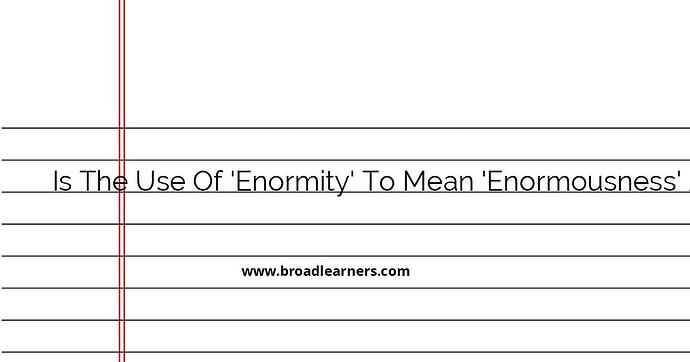The word 'enormity' is often misunderstood and misused in English language. A common query relates to whether using 'enormity' to mean 'enormousness' is considered a mistake. Let's delve into the meanings of these words, their differences, and how to use them correctly:
Definitions
- Enormity:
- 'Enormity' traditionally refers to something that is morally wrong or wicked on a grand scale. It can describe a situation or action that is perceived as monstrous or heinous. It is not typically associated with size.
- Enormousness:
- 'Enormousness' is used to describe something that is large in size or extent without any connotations of wickedness or moral judgment. It is synonymous with size and volume.
Usage Error: 'Enormity' for 'Enormousness'
- Using 'enormity' to mean 'enormousness' is considered a misuse, especially in formal writing. This is because 'enormity' carries an implication of wickedness or moral gravity that is absent in 'enormousness'.
- Despite recent trends where 'enormity' is sometimes used to imply largeness, traditionalists and purists consider this use incorrect due to the historical meaning of the term.
Examples and Sentences
To further clarify, here are examples illustrating the correct usage of both words:
Examples of 'Enormity':
The enormity of the crime shook the community to its core.
She could not comprehend the enormity of the dictator's actions.
In these sentences, 'enormity' is used to refer to actions with moral implications rather than mere size.
Examples of 'Enormousness':
The enormousness of the mountain left him breathless.
We were awed by the enormousness of the universe as we gazed at the stars.
In these sentences, 'enormousness' is used to highlight vastness or largeness, without any moral judgment.
Conclusion
In conclusion, while language does evolve, understanding the traditional distinction between 'enormity' and 'enormousness' is crucial for clear and precise communication. In formal or professional settings, it is advisable to use these words according to their established meanings. This helps avoid ambiguity and ensures that your writing accurately conveys your intended message.
By acknowledging these distinctions, you can enrich your vocabulary and enhance your communication skills, thereby fostering a precise expression of ideas.
Did I miss anything? Respond below
